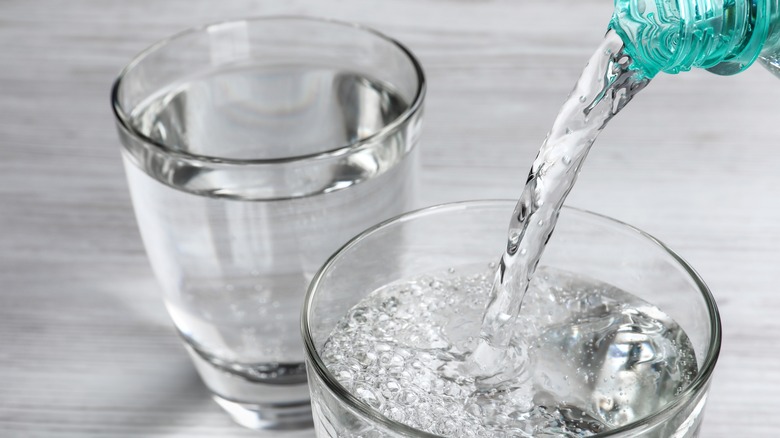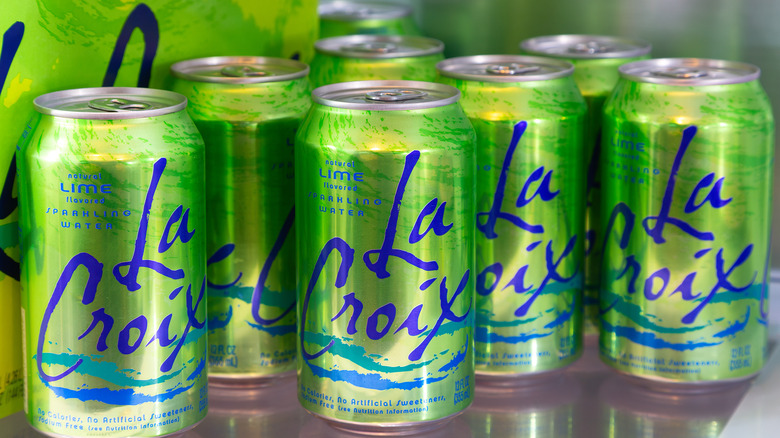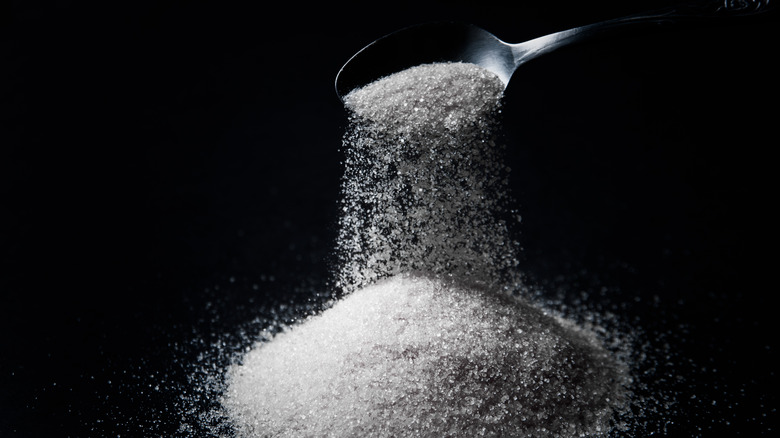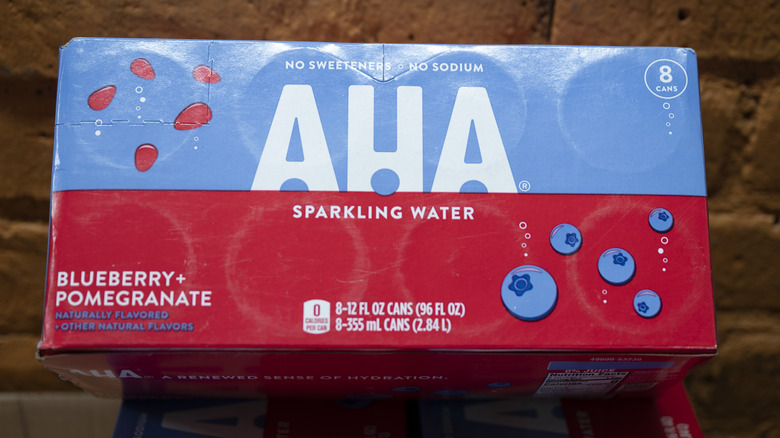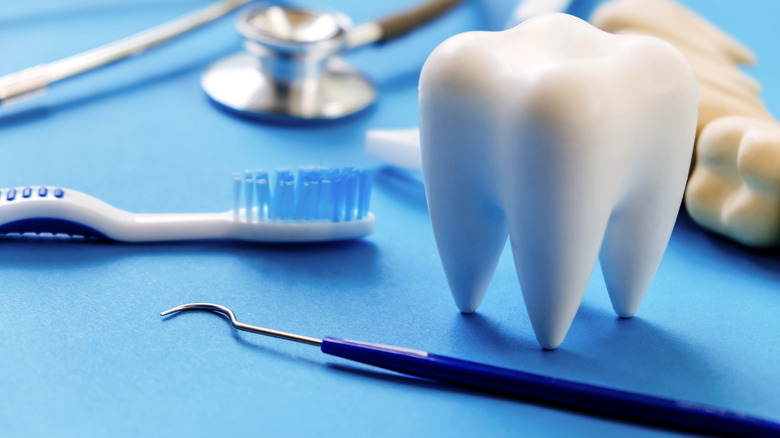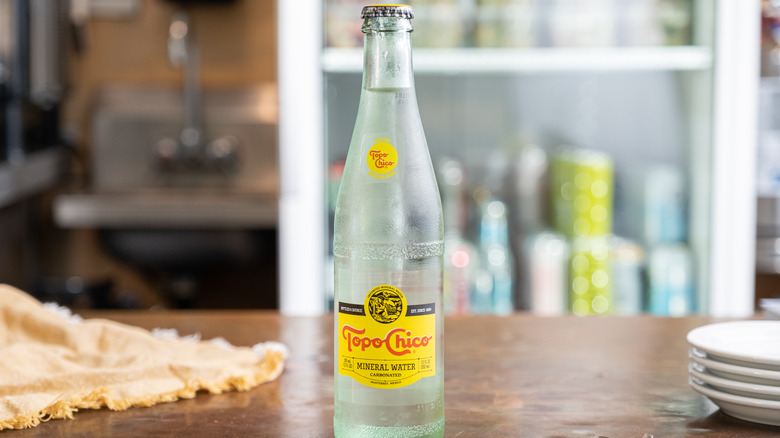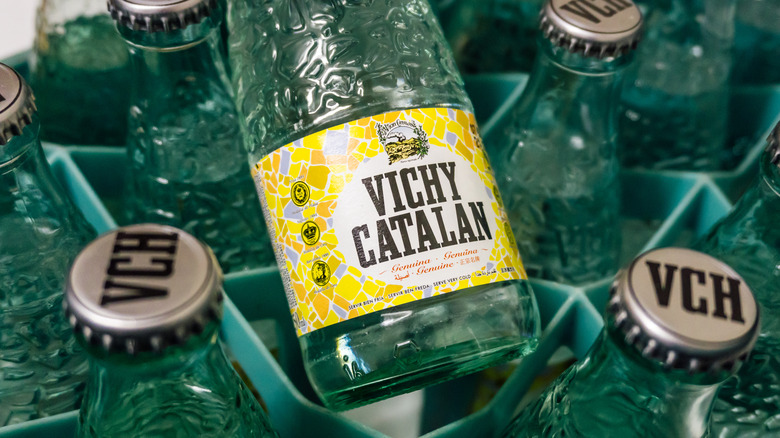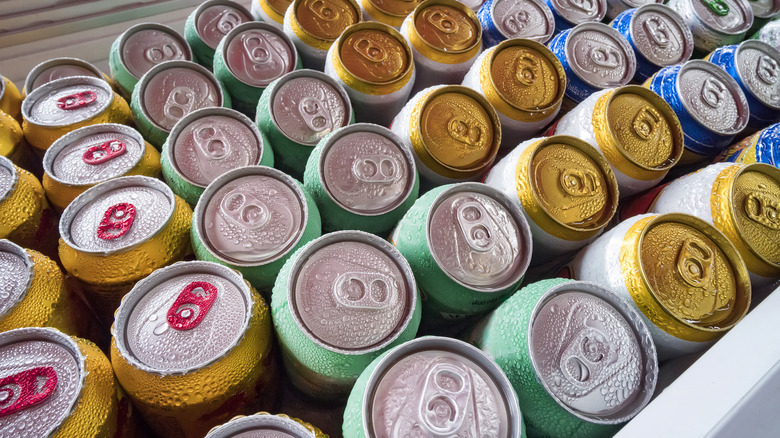8 Reasons You Might Want To Drink Less Sparkling Water
Sparkling water is a big business, with the sparkling water industry projected to grow to a value of $85.69 billion by 2030, according to Fortune Business Insights. Brands like La Croix, Topo Chico, and Perrier all tussle with each other to draw customers in and pump out ever more ambitious flavors for people looking to stay hydrated in a more interesting way.
It's natural, though, to consider whether these flavored sparkling waters, which can be pretty sweet, are actually that healthy for you — and what the effect of drinking even unflavored sparkling water is on your body. Importantly, if you're drinking sparkling water in moderation, its effects are predominantly positive. "Carbonated water is made from water and, therefore, can be just as hydrating as regular water. Actually, sparkling mineral water may be particularly hydrating because of its high electrolyte content," said registered dietitian Karina Heinrich via Byrdie.
Sparkling water may also help keep the digestive system healthy and ease constipation and can serve as a replacement for soda. However, while many sparkling waters are simply made from water and a carbonating gas, others can have added sugars, sodium, or flavorings, which means you're drinking more than you bargained for. Additionally, its carbonated nature may also produce some unwanted side effects if you're drinking it in higher quantities. In this article, we drew from a range of health professionals, trusted health organizations, and clinical studies to discuss the reasons why drinking large amounts of sparkling water may not always be the best idea.
1. Sparkling water can promote acid reflux
Acid reflux is caused when the contents of our stomach, including our stomach acid, leak back up into our esophagus through the lower esophageal sphincter, according to Mount Sinai. For some, this is a frequent issue that sparkling water can exacerbate. Sparkling water is given its fizziness by carbon dioxide, which is infused with the water in a high-pressure environment, causing it to become effervescent.
When you drink it, though, this carbon dioxide is swallowed down, and this can cause gastric distention from bloating and essentially make your esophageal sphincter looser, explains the Cleveland Clinic's gastroenterologist Saleem Chowdhry, per SELF. As a result, stomach acid can move more freely back into the esophagus, resulting in discomfort and heartburn.
Chowdhry notes that this is usually more likely to happen if you drink sparkling water directly after a meal, as well as if you're drinking a lot of it. While occasional heartburn can be quite common, if you experience acid reflux frequently or have gastroesophageal reflux disease, it's a good idea to limit your sparkling water intake or cut it out of your diet, or else try to avoid drinking it around meal times.
2. It may have hidden sugars
Most sparkling water brands, some of the most well-known, like Waterloo, La Croix, and bubly, make sugar-free products that contain no calories. That may not be the case across the board, though. Some sparkling waters can have hidden sugars in them, which are added to improve their taste. This is particularly common when it comes to sparkling water products like tonic water, which can have added sugar from several different sources, but it can also be the case with regular sparkling waters.
These sugars can often go unnoticed, and as is the case with other sugary beverages, they can increase our sugar intake significantly, which may lead to eventual health problems. As a review published in the Journal of the American College of Cardiology points out, regular consumption of sugar-sweetened beverages has been linked to a higher risk of cardiovascular disease and type 2 diabetes.
It's always a good idea, therefore, to check the label of your sparkling water before buying it to determine whether it has added sugars or not. While the amounts may be minimal and might not have a big impact on your health, if you consume sparkling water in particularly large quantities, it's important to be aware of what's in your drink.
3. The natural flavors in them aren't actually that beneficial
Sparkling waters frequently proclaim that they're imbued with "natural flavors." Now, to some people, this can be pretty comforting — after all, you'd rather drink something flavored naturally than something flavored artificially, right? The truth, though, is that the term "natural flavors" is pretty loose and may not be an indicator that something is healthier or better for you.
If something is labeled as being flavored "naturally," it means that the flavorings inside are derived from a plant or animal source instead of a man-made chemical. However, this doesn't necessarily mean that those flavorings are healthier, and natural flavors can still contain added chemicals, even if their base origin is natural. There's also nothing to stop natural flavors from being derived from genetically modified sources. In addition to this, there's often no way to tell exactly what a natural flavor is made from unless you call the food company directly and ask.
Crucially, this isn't to say that the natural flavors in your sparkling water are bad for you in some way. It's important, though, to remember that when something is labeled as "natural," it may be a canny marketing trick, and you should always look to see what else is in the product.
4. Large amounts can cause gas
You don't need a Ph.D. in chemistry to figure out that sparkling water has gas in it. When that gas gets into your system, though, it tends to stick around for a while — and that's where the trouble starts. Drinking sparkling water can cause your stomach to bloat temporarily, and this can make you feel uncomfortable or limit your movement. Although some of this gas is absorbed into your bloodstream, the rest of it will either need to come out by belching or passing wind, which may cause some awkward moments.
Generally, moderate amounts of sparkling water won't cause any significant bloating or gas, but higher quantities can make the issue worse. "If you feel bloated, are constantly belching or have reflux, stop drinking carbonated water until symptoms disappear," advises gastroenterologist Aja McCutchen, per EatingWell.
McCutchen also points out that drinking it quickly can make gas even more likely, as this can cause you to take on more air than usual. Drinking through a straw can also have the same effect, with the trapped air in the straw being delivered directly to the back of your mouth and contributing to the carbon dioxide from your beverage.
5. Sparkling water can have an impact on dental health
You may not know it, but sparkling water is acidic. Unlike regular water, which tends to have a pH level of somewhere between 6 ½ and 8 ½, sparkling water's pH level is a lot lower and can clock in at as low as pH 3 to 4. Its acidity is caused during the carbonation process, with the carbon dioxide added, resulting in the water containing carbonic acid.
Unfortunately, this may all affect your teeth. The mild acids in sparkling water may have an impact on your tooth enamel if you're drinking a lot of it and may contribute to its erosion. This can make your teeth more sensitive or prone to chipping or breaking and may also increase your likelihood of developing tooth decay, according to Healthline.
However, the fact of the matter is that moderate consumption of unflavored sparkling water is likely to do much damage. Drinking carbonated beverages full of sugar is a far bigger issue for tooth health, as this causes the production of acid in the mouth that can attack your teeth, according to the Mississippi State Department of Health. It's really important to keep in mind, though, that some sparkling water products can have added sugar in them, which may pose more of a risk to your dental health.
6. You might be paying above the odds
The biggest reason you might want to cut down on your sparkling water intake is due to its impact on your wallet. There's little denying that buying sparkling water is more expensive than drinking tap water, and its price can be even more noticeable if you're splashing out on more luxurious brands or innovative flavors. It's important to remember that this price point is not reflective of how much it costs to make.
Compared to other products, sparkling water is incredibly cheap to produce, and its inflated price point is essentially created by supply and demand and a lengthier, more complicated distribution process. There are ways to get around paying top dollar for sparkling water, with one of them being to make it at home by purchasing a SodaStream or equivalent product.
However, even that requires up-front costs and continual purchases. It's fine to buy it if that's your thing, of course — people have spent money on far worse — but just bear in mind that drinking nothing but sparkling water can put a dent in your wallet and a lot of money in the pockets of drinks executives.
7. Sparkling water can be high in sodium
While we usually get the majority of our sodium from food, certain beverages can be higher in it than you think. Vegetable juice, sports drinks, and some types of soda can be surprisingly high in sodium, and sparkling water can also be added to that list.
Not every sparkling water brand has sodium in it, with many brands making either sodium-free products or drinks that have very low levels of the mineral. In other cases, however, the sodium level of sparkling water can be pretty shocking: Vichy Catalan, a Spanish natural sparkling mineral water, has well over 1,000 milligrams of sodium per bottle.
Other sparkling water brands may have a sodium content of 100 to 200 milligrams per can, and if you're drinking a few or more per day, this can make a massive contribution to your daily intake. Remember that sodium can have an enormous impact on your body, regardless of whether you're consuming it in a drink or solid food. Regular high sodium intake can cause individuals to develop high blood pressure and be more at risk of stroke or cardiovascular disease, according to the Harvard T. H. Chan School of Public Health.
8. Canned sparkling water may have unwanted chemicals
The satisfying hiss of a can opening is part of the sensory appeal of drinking sparkling water. However, that same can may be causing more issues than you think. For a long time, food and drink cans were lined with a substance called bisphenol A, or BPA for short. This controversial chemical has caused significant concern because of its potential to leech into the food or drink you're consuming and its subsequent health effects, which include a higher risk of high blood pressure, type 2 diabetes, and developmental and behavioral differences in infants and children, according to the Mayo Clinic.
This isn't something that the food industry has ignored, of course, and a large number of companies have phased out the use of BPA. The chemicals that have replaced it, though, have their own issues.
"There are a lot of misconceptions about the replacements, and the transparency is really lacking. You have a potent mixture of chemicals in each lining, but we don't know how they're interacting together and how they're interacting in our bodies," says the Environmental Working Group's senior research analyst Samara Geller via PCC Markets. If you're concerned, it may be prudent to buy your sparkling water in a glass bottle instead of a can.
